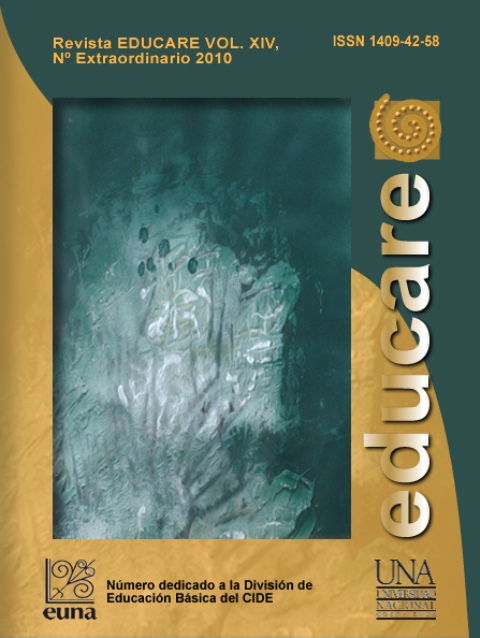The Pleasure of Learning
DOI:
https://doi.org/10.15359/ree.14-Ext.3Keywords:
rising paradigm, pedagogy, learning, pleasure, construction, knowledgeAbstract
The evolution, from an education centered in teaching to a perspective of learning, constitutes a change of paradigm as stated by the author in this article - who invites us to use the pleasure of learning as a facilitator for the construction of the senses. The author underlines that education must advance from the non-critical repetition of content to the generation of pleasant learning, and that the search for alternatives for an education that overcomes the traditional paradigm leads to the need to promote an authentic learning pleasure.
References
Alvarado, E. (2007). Educación-Ecología-Economía. Pasos hacia otra epistemología. Costa Rica:
Alma Mater.
Assmann, H. (2002). Placer y ternura en la educación. Madrid: Narcea.
Briggs, J. y Peat, D. (1999). Las siete leyes del caos. España: Grijalbo.
Capra, F. (1998). La trama de la vida. España: Editorial Anagrama.
Cerdas, J. (2008). Conversatorio Educación y Arte. Costa Rica: Universidad De La Salle.
Chaves, J. (1999). De la utopía a la política económica. España: Editorial San Esteban.
Flores, L., Flores, G., Jiménez, R., Madrigal, J., y Perearnau, M. (2009). Comunidad Aprendiente.
Costa Rica: Artemusa Editora.
Gómez, C. (1998). La gestión económica de los recursos naturales y sus críticos. Madrid:
Universidad de Alcalá.
Gutiérrez, F. (2008). La educación que tenemos pone en peligro el destino de A. L. Recuperado de
http://noticiasdesdeveracruz.blogspot.com/2008/02/dijo-francisco-gutirrez-de-la.html
Johnson, R. (1992). Éxtasis. Psicología del gozo. España: Kairós.
Kaku, M. (1998). Visiones. Cómo la ciencia revolucionará la materia, la vida y la mente en el siglo
XXI. España: Debate.
Maturana, H. (1999). Transformación en la convivencia. Chile: Dolmen Ediciones.
Maturana, H. y Pörksen, B. (2004). Del ser al hacer. Chile: LOM.
Rosas, R. y Sebastián, C. (2001). Piaget, Vigotski y Maturana. Constructivismo a tres voces.
Argentina: AIQUE.
Wagensberg, J. (1998). Ideas sobre la complejidad de mundo. España: Tusquets Editores.
Wagensberg, J. (2004). La rebelión de las formas. España: Tusquets editores.
Downloads
Published
How to Cite
Issue
Section
License
1. In case the submitted paper is accepted for publication, the author(s) FREELY, COSTLESS, EXCLUSIVELY AND FOR AN INDEFINITE TERM transfer copyrights and patrimonial rights to Universidad Nacional (UNA, Costa Rica). For more details check the Originality Statement and Copyright Transfer Agreement
2. REUTILIZATION RIGHTS: UNA authorizes authors to use, for any purpose (among them selfarchiving or autoarchiving) and to publish in the Internet in any electronic site, the paper´'s final version, both approved and published (post print), as long as it is done with a non commercial purpose, does not generate derivates without previous consentment and recognizes both publisher's name and authorship.
3. The submission and possible publication of the paper in the Educare Electronic Journal is ruled by the Journal’s editorial policies, the institutional rules of Universidad Nacional and the laws of the Republic of Costa Rica. Additionally, any possible difference of opinion or future dispute shall be settled in accordance with the mechanisms of Alternative Dispute Resolution and the Costa Rican Jurisdiction.
4. In all cases, it is understood that the opinions issued are those of the authors and do not necessarily reflect the position and opinion of Educare, CIDE or Universidad Nacional, Costa Rica. It is also understood that, in the exercise of academic freedom, the authors have carried out a rogorous scientific-academic process of research, reflection and argumentation thar lays within the thematic scope of interest of the Journal.
5. The papers published by Educare Electronic Journal use a Creative Commons License:















 The articles published by Educare Electronic Journal can be shared with a Creative Commons License:
The articles published by Educare Electronic Journal can be shared with a Creative Commons License: 



